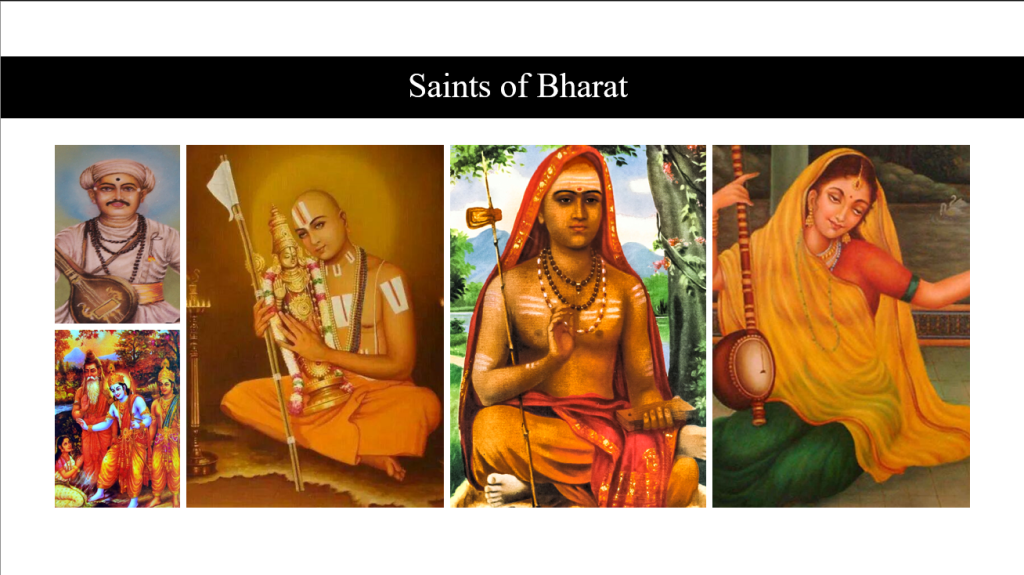India is renowned for its rich tapestry of saints and philosophical values that have significantly impacted humanity, guiding individuals toward becoming better versions of themselves. Throughout history, various saints have emerged across different periods, each contributing uniquely to the spiritual and cultural heritage of the country. Their ideologies and teachings continue to resonate with people, making them timeless figures. Here, we explore the lives and teachings of some of the most famous Indian saints of all time, whose profound contributions have shaped spiritual thought and practice in India.
Top 10 Famous Indian Saints of all Time
1. Ramanuja
Ramanuja is celebrated as one of the early pioneers of the Bhakti movement, a major spiritual reform that emphasized devotion to God. As a prominent disciple of his guru, Yamunamuni, Ramanuja traveled extensively across India, ultimately settling in Srirangam, Tamil Nadu. He is renowned for solidifying Vaishnavism and founding the Visistadvaita Siddhanta, a philosophy that advocates qualified monism. Ramanuja’s teachings emphasize that salvation can be achieved through Karma (action), Bhakti (devotion), and Gyan (knowledge). His notable works include the “Gitabhasya” and “Sribhasya,” which continue to influence Hindu philosophy and practice.
2. Chaitanya Mahaprabhu
Chaitanya Mahaprabhu, born as Vishwambhar Mishra in Nawadwip, Bengal, was a pivotal figure in the Bhakti movement. He is renowned for his role in spreading Vaishnavism throughout Bengal and his practice of Kirtan, devotional singing. Chaitanya Mahaprabhu established a theological school and devoted himself to the worship of Lord Krishna and Radha. His spiritual practices aimed to enhance devotion and spiritual life in the holy city of Vrindavan. His teachings were later compiled into the “Chaitanya Charitamrita,” a significant biographical and theological work that continues to guide his followers.
3. Shirdi Sai Baba
Shirdi Sai Baba, a revered spiritual master, bridged the gap between Hinduism and Islam with his teachings. His life and teachings emphasized self-realization, forgiveness, and the rejection of materialism. Sai Baba preached love, compassion, and inner peace while denouncing caste and religious discrimination. His teachings promoted the values of selfless service and devotion to God. Devotees often regard him as an incarnation of the Hindu deity Dattatreya, and his legacy continues to inspire countless individuals across religious boundaries.
4. Tulsidas
Tulsidas, a prominent Vaishnava saint and poet, dedicated his life to the worship of Lord Rama. He is best known for composing the “Hanuman Chalisa,” a devotional hymn dedicated to Lord Hanuman, which remains widely recited in India. Tulsidas spent much of his life in Banaras and Ayodhya, where he also founded the Sankat Mochan Hanuman Temple. His literary contributions include the “Ramcharitmanas,” a retelling of the Ramayana in Hindi. Tulsidas’s works have left an indelible mark on Indian literature, art, and culture, reinforcing the significance of devotional worship.
5. Surdas
Surdas, a 16th-century blind devotional poet, is celebrated for his profound devotion to Lord Krishna. His compositions, predominantly in Braj Bhasha, reflect his deep adoration and spiritual insights. Surdas’s poetry is integral to the Puṣṭimārga tradition, which emphasizes devotional singing and worship. His works remain influential in the devotional practices of the Vallabha Sampradaya, and his legacy continues to be studied and revered in modern times.
6. Kabir
Kabir, born near Benaras, was a poet-saint known for his unorthodox and inclusive approach to spirituality. As a follower of Ramananda, Kabir aimed to unify people across castes and religions through his message of divine love. He emphasized the unity of God, transcending religious distinctions, and critiqued both Hindu and Muslim rituals. Kabir’s teachings, preserved in his dohas and sakhi poems, focus on personal spirituality and the rejection of social hierarchies. His followers established communities in Maghar and Banaras, continuing his legacy of spiritual and social reform.
7. Ramakrishna Paramahansa
Shri Ramakrishna Paramahansa, born on February 18, 1836, in Kamarpukur, was a revered mystic and spiritual teacher. Known for his deep spiritual experiences and devotion to Goddess Kali, Ramakrishna is celebrated as one of the foremost saints of the 19th century. He explored various religious traditions and emphasized the unity of all faiths. Although he considered himself an incarnation of Lord Vishnu, he never proclaimed this publicly. His teachings on the universality of spiritual experiences continue to inspire seekers worldwide.
8. Guru Nanak
Guru Nanak Dev Ji, the founder of Sikhism, is a central figure in the religious and spiritual landscape of India. His teachings, which form the foundation of Sikhism, emphasize monotheism and devotion to the divine name. Guru Nanak’s hymns reflect his vision of a society free from the cycle of reincarnation through meditation and righteous living. His contributions to Punjabi devotional music and his role as the first Sikh Guru have made a lasting impact on Sikh religious practices and beliefs.
9. Guru Gobind Singh
Guru Gobind Singh, the ninth Sikh Guru, is renowned for his role in shaping Sikhism during a turbulent period. As a warrior, poet, and philosopher, he succeeded his father, Guru Tegh Bahadur, as the leader of the Sikhs at a young age. Guru Gobind Singh established the Khalsa, a community of dedicated Sikh warriors, and introduced the Five Ks, symbolic articles of faith worn by Khalsa Sikhs. His leadership and reforms significantly contributed to the evolution and consolidation of Sikh identity.
10. Mahavira
Mahavira, the 24th Tirthankara of Jainism, is a foundational figure in Jain philosophy. Born into a royal Jain family in the early sixth century BCE, Mahavira renounced worldly possessions to seek spiritual enlightenment. His rigorous ascetic practices and profound meditation led him to achieve Kevala Jnana (omniscience). Mahavira’s teachings, which emphasize non-violence, non-possessiveness, and spiritual liberation, continue to be central to Jain religious practice and thought.
In conclusion, the lives and teachings of these famous Indian saints of all time have profoundly shaped the spiritual and cultural fabric of India. Their wisdom and ideals transcend time, offering guidance and inspiration for generations. Through their teachings, these saints have contributed significantly to the betterment of society, advocating values of love, devotion, and spiritual realization. Their enduring legacy highlights the profound impact of spiritual leadership on human development and cultural enrichment.


